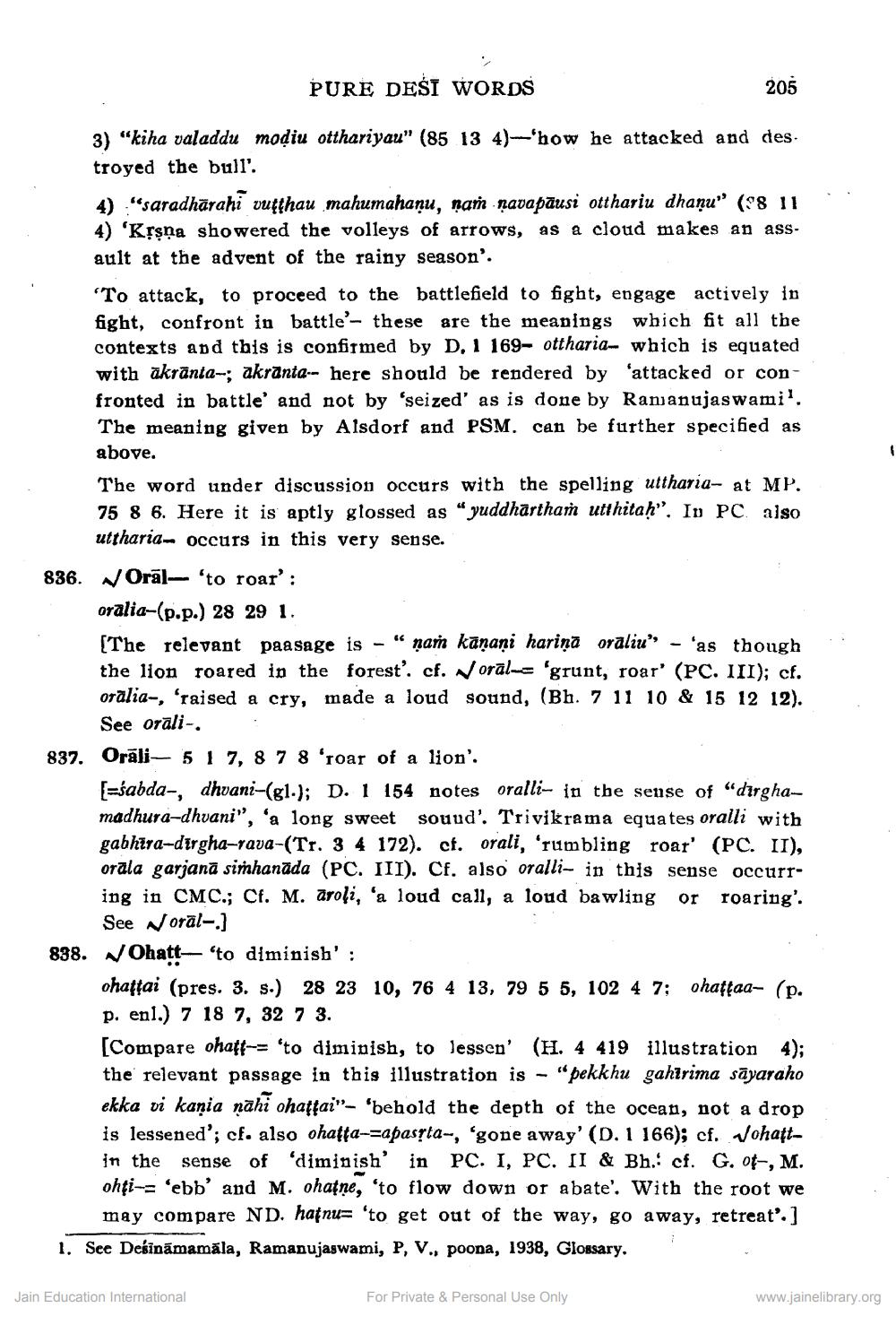________________
PURE DEŚI WORDS
205
3) “kiha valaddu modiu otthariyau" (85 13 4)--how he attacked and des. troyed the bull'.
4) "saradhārahi vutthau mahumahanu, nam navapāusi otthariu dhanu" (:8 11 4) 'Krşņa showered the volleys of arrows, as a cloud makes an assault at the advent of the rainy season'. "To attack, to proceed to the battlefield to fight, engage actively in fight, confront in battle'- these are the meanings which fit all the contexts and this is confirmed by D, 1 169- ottharia- which is equated with akrānta-; akrānta- here should be rendered by 'attacked or confronted in battle' and not by 'seized' as is done by Ranjanujaswamil. The meaning given by Alsdorf and PSM. can be further specified as above. The word under discussion occurs with the spelling uttharia- at MP. 75 8 6. Here it is aptly glossed as "yuddharthaṁ utthitaḥ". In PC also
uttharia. occurs in this very sense. 836. „Orāl— 'to roar':
oralia-(p.p.) 28 29 1. [The relevant paasage is - “ņam kānani hariņā oraliu' - 'as though the lion roared in the forest'. cf. oral-c 'grunt, roar' (PC. III); cf. oralia-, 'raised a cry, made a loud sound, (Bh. 7 11 10 & 15 12 12).
See orali-, 837. Orāli - 5 1 7, 8 7 8 'roar of a lion'.
[=sabda-, dhvani-(gl.); D. 1 154 notes oralli- in the sense of "dirghamadhura-dhvani", 'a long sweet souud'. Trivikrama equates oralli with gabhira-dirgha-rava-(Tr. 3 4 172). cf. orali, 'rumbling roar' (PC. II), orala garjanā simhanāda (PC. III). Cf. also oralli- in this sense occurring in CMC.; Cf. M. aroli, 'a loud call, a loud bawling or roaring'.
See oral-.] 838. Ohatt- 'to diminish' :
ohafțai (pres. 3. s.) 28 23 10, 76 4 13, 79 5 5, 102 4 7; chattaa- (p. p. enl.) 7 18 7, 32 7 3. [Compare ohati-= 'to diminish, to lessen' (H. 4 419 illustration 4); the relevant passage in this illustration is - "pekkhu gahirima sāyaraho ekka vi kania nahi chaffai"- 'behold the depth of the ocean, not a drop is lessened'; cf. also chatfa-=apassta-, 'gone away' (D. 1 166); cf. Johaftin the sense of diminish' in PC. I, PC. II & Bh. cf. G. 0-, M. ohti-= 'ebb' and M. ohatne, 'to flow down or abate'. With the root we
may compare ND. hafnu= 'to get out of the way, go away, retreat'. ] 1. See Desināmamāla, Ramanujaswami, P, V., poona, 1938, Glossary.
Jain Education International
For Private & Personal Use Only
www.jainelibrary.org




